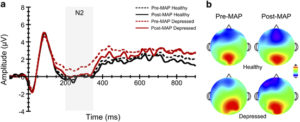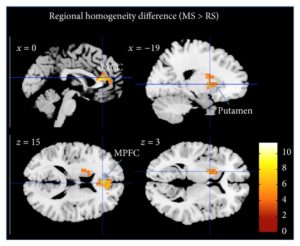
By John M. de Castro, Ph.D.
“People with PTSD ruminate, and rumination is all about not being present. It’s all about focusing on something terrible that happened in the past or something frightening that will happen in the future, so these patients are stuck in a rut. My personal bias is that mindfulness-based therapy has a big effect on rumination, and decreasing rumination allows people to experience the present moment, which expands their awareness of different possibilities and increases their ability to pay attention to things they have avoided in the past,” – Anthony King
Experiencing trauma is quite common. It has been estimated that 60% of men and 50% of women will experience a significant traumatic event during their lifetime. Many, but, only a fraction will develop Post-Traumatic Stress Disorder (PTSD). But this still results in a frightening number of people with 7%-8% of the population developing PTSD at some point in their life.
PTSD can be produced by traumatic events occurring to anyone in a variety of different contexts. These include interpersonal violence (IPV). It is defined “as the intentional use of physical or sexual violence against another person within the context of a relationship. This includes physical or sexual violence committed by a family member, intimate partner, friend, or acquaintance.” A frequent form of IPV is intimate partner violence. Indeed, 27% of women and 11% of men have reported that they had been harmed by sexual or physical violence at some time during their lives.
PTSD involves a number of troubling symptoms including reliving the event with the same fear and horror in nightmares or with a flashback. PTSD sufferers avoid situations that remind them of the event this may include crowds, driving, movies, etc. and may avoid seeking help because it keeps them from having to think or talk about the event. They often experience negative changes in beliefs and feelings including difficulty experiencing positive or loving feelings toward other people, avoiding relationships, memory difficulties, or see the world as dangerous and no one can be trusted. Sufferers may feel hyperarousal, feeling keyed up and jittery, or always alert and on the lookout for danger. They may experience sudden anger or irritability, may have a hard time sleeping or concentrating, may be startled by a loud noise or surprise.
Obviously, these are serious and troubling symptoms that need to be addressed. There are a number of therapies that have been developed to treat PTSD. One of which, mindfulness training has been found to be particularly effective. In today’s Research News article “Trauma-Informed Mindfulness-Based Stress Reduction for Female Survivors of Interpersonal Violence: Results from a Stage I RCT.” See:
or below
Kelly and Garland randomly assigned adult female survivors of interpersonal violence (IPV) to either an 8-week mindfulness training or wait-list control condition. The intervention was a form of Mindfulness Based Stress Reduction (MBSR) that was modified for treatment with trauma survivors.
They found that the treatment produced a clinically significant decrease in PTSD symptoms to the point where a significant number of participants could no longer be classified as PTSD sufferers. The more the participant practiced the mindfulness training the greater the reduction in PTSD symptoms. There were also significant decreases in the mindfulness group in depression and anxious attachment. Anxious attachment is a symptom of PTSD that involves “vacillating between attempts to draw in significant others with endearing attention-seeking behaviors and attempts to attract attention through emotional outbursts of crying or anger.” Reducing anxious attachment allows the sufferer to conduct much healthier interpersonal relationships.
These are very promising results that suggest that the modified form of Mindfulness Based Stress Reduction (MBSR) is a safe and effective treatment for PTSD caused by interpersonal violence (IPV). It is not known how mindfulness training could be so effective for PTSD. It can be speculated that the improvement in present moment awareness might have helped by focusing on the individual on the present rather than the past when the trauma occurred and by reducing rumination about the past. In addition, mindfulness training is known to improve emotion regulation and this may allow the PTSD sufferers to not avoid but fully experience the emotions and then respond to them in a constructive fashion. Finally, mindfulness training is known to reduce the physiological and psychological responses to stress. This lowered stress levels may reduce the intensity of their response to memories of the trauma, allowing the individual to be able to internally address the events directly.
Regardless of the mechanism, it is clear that mindfulness training is an effective treatment for PTSD symptoms caused by interpersonal violence (IPV). So, cope with violence trauma with mindfulness.
“Mindfulness-based stress reduction teaches individuals to attend to the present moment, to attend to what they are experiencing — their thoughts, their feelings — in a nonjudgmental, accepting manner. We think that teaching people these mindfulness skills helps them to have a different relationship with their PTSD symptoms — a willingness to let thoughts be there without trying to push them away,” -Melissa Polusny
CMCS – Center for Mindfulness and Contemplative Studies
Study Summary
Kelly, A. and Garland, E. L. (2016), Trauma-Informed Mindfulness-Based Stress Reduction for Female Survivors of Interpersonal Violence: Results From a Stage I RCT. J. Clin. Psychol., 72: 311–328. doi:10.1002/jclp.22273
Abstract
OBJECTIVE: This pilot randomized controlled trial evaluated a novel trauma-informed model of mindfulness-based stress reduction (TI-MBSR) as a phase I trauma intervention for female survivors of interpersonal violence (IPV).
METHOD: A community-based sample of women (mean age = 41.5, standard deviation = 14.6) with a history of IPV was randomly assigned to an 8-week TI-MBSR intervention (n = 23) or a waitlist control group (n = 22). Symptoms of posttraumatic stress disorder (PTSD) and depression as well as anxious and avoidant attachment were assessed pre- and postintervention.
RESULTS: Relative to the control group, participation in TI-MBSR was associated with statistically and clinically significant decreases in PTSD and depressive symptoms and significant reductions in anxious attachment. Retention in the intervention was high, with most participants completing at least 5 of the 8 sessions for the intervention. Minutes of mindfulness practice per week significantly predicted reductions in PTSD symptoms.
CONCLUSION: TI-MBSR appears to be a promising and feasible phase I intervention for female survivors of interpersonal trauma.








